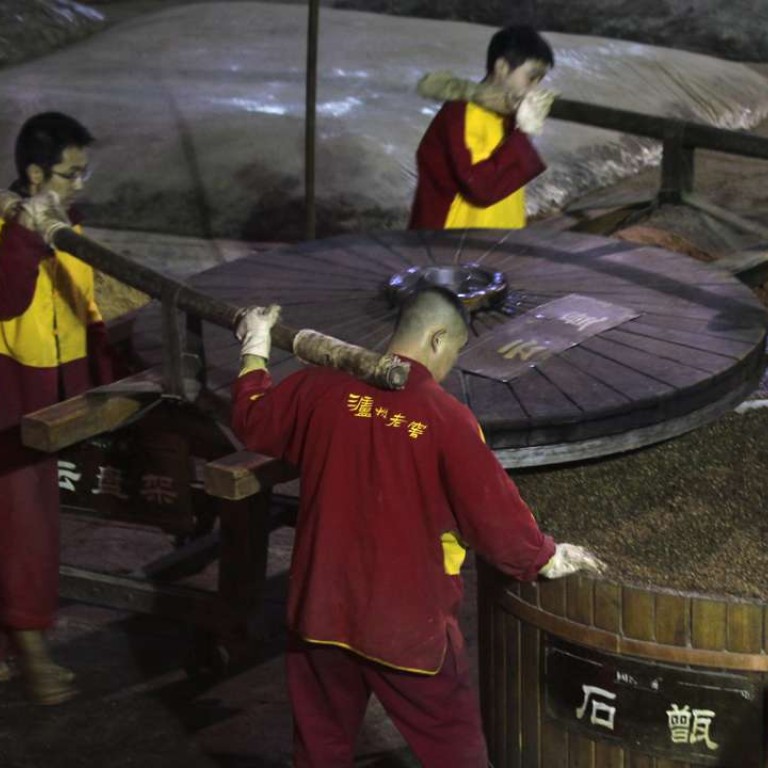
New Shenzhen stock link expected to raise the spirits of listed Chinese liquor firms
Shares in premium baijiu producers tipped to be attractive to foreign buyers as they are considered ‘China-unique’ companies
Offshore investors will soon have the ability to buy into three Shenzhen-listed Chinese liquor makers, Wuliangye Yibin, Luzhou Laojiao, and Jiangsu Yanghe Brewery, through the Shenzhen-Hong Kong Stock Connect, just as each posted strong third-quarter results.
Experts suggest premium producers of Chinese liquor, most often referred to as “baijiu”, could prove especially attractive to foreign buyers using the new link as they are considered “China-unique” companies with robust business growth, thanks mainly to increased expenditure on entertainment by mainland Chinese.
Shanghai-listed liquor maker Kweichow Moutai, the country’s biggest distiller by sales, said last week that its net profit for the third quarter climbed 5.9 per cent year on year to 3.7 billion yuan, with revenue up around 4.6 per cent to 7.9 billion yuan, as the whole industry continues to recover from government’s crackdown on luxury spending which hurt the industry in recent years, thanks to rising household consumption.
Moutai competes head-on with smaller local rival Wuliangye Yibin.
Shares in Shanghai-listed Kweichow Moutai have jumped 48.2 per cent so far this year, and are up 130 per cent since the Shanghai-Hong Kong Stock Connect was launched in November, 2014. Wuliangye has seen its stocks rise 98 per cent since the Shanghai linkup.
And analysts now expect the launch of Shenzhen-Hong Kong Stock Connect will help the three Shenzhen-listed liquor makers catch up with the rally in Moutai shares.
Wuliangye’s revenue in the first nine months (three quarters) surged 16.97 per cent year on year to 17.7 billion yuan, with net profit rising 10.83 per cent to 5.1 billion yuan, according to its latest set of figures filed with the Shenzhen bourse.
“There is no doubt, Wuliangye is going to disclose a good financial report for the whole year. In addition to 17.7 billion yuan revenue for the first nine months, its prepaid revenue increased 4.7 billion yuan year on year,” said Hu Yanchao from Zhongtai Securities, in a research report.
That represents revenue of at least 22.4 billion yuan this year, compared with total revenue of 21.7 billion yuan last year.
The results were driven by a collective rise in sales and selling prices, Hu said, estimating annual volumes to rise 5.5 per cent year on year, with prices up 10 per cent.

More price rises are expected by Wuliangye, according to China Merchants Securities (CMS), especially given the price gap with Moutai, considered the premier name in the sector, has been as wide as 300 yuan as Moutai has continued to raise its wholesale price, to nearly 1,000 yuan a bottle.
“A small price rise is certain before the Spring Festival,” CMS analysts wrote, now expecting the Wuliangye wholesale price to reach 700 yuan from 680 yuan a bottle.
Ping An Securities analysts say the valuations of Shenzhen-listed liquor stocks remain cheap.
The price to earnings ratio of Wuliangye was 19.71 times, while that of Kweichow Moutai – one of the most traded stocks under Shanghai-Hong Kong Stock Connect – was 24.01 times.
Luzhou Laojiao, meanwhile, also posted robust growth, with net profit for the first nine months rising 13.9 per cent year on year to 1.5 billion yuan and revenue up 17.3 per cent to 5.9 billion yuan.
“The price rises by Moutai and Wuliangye have created a good operating environment for Luzhou Laojiao too,” Soochow Securities analysts Ma Haobo and Tang Weiliang wrote in a note. They said revenues by Guojiao 1573, a brand owned Luzhou Laojiao, were the highlight.
Ma and Tang added that pricing is crucial in the traditional Chinese spirits market, and that Guojiao 1573 should always maintain a discount of around 60 yuan compared with Wuliangye.
Jiangsu Yanghe, meanwhile, saw its net profit for the nine months rise 8.47 per cent year on year to 4.84 billion yuan with revenue up 7.4 per cent to 14.67 billion yuan.
Sales growth improved in the third quarter compared with the second quarter, thanks to better control in products delivery, CMS said in its report, adding that with cheap valuation, with 16.7 times of P/E ratio, it will prove attractive once the Shenzhen stock link starts operating.

